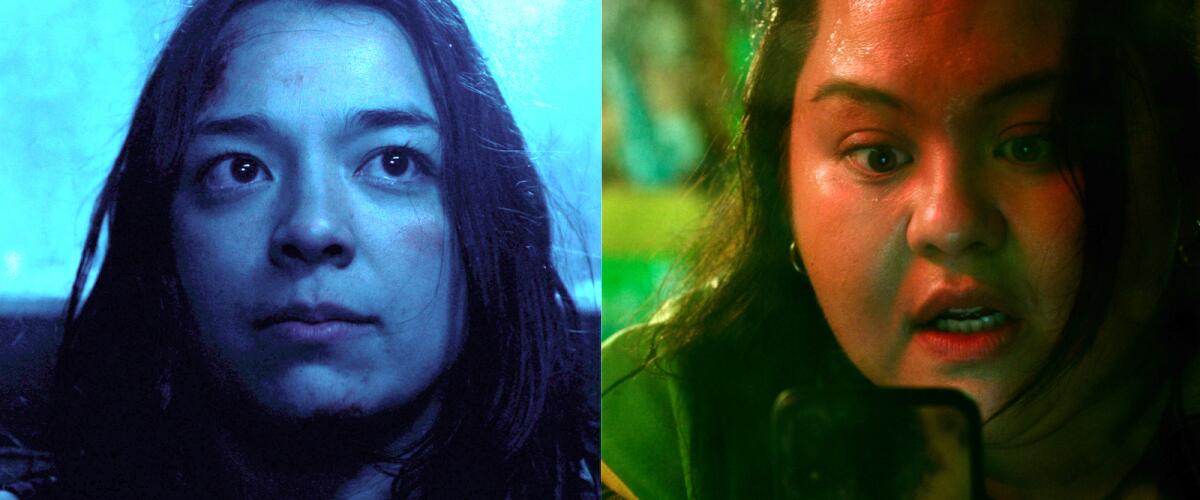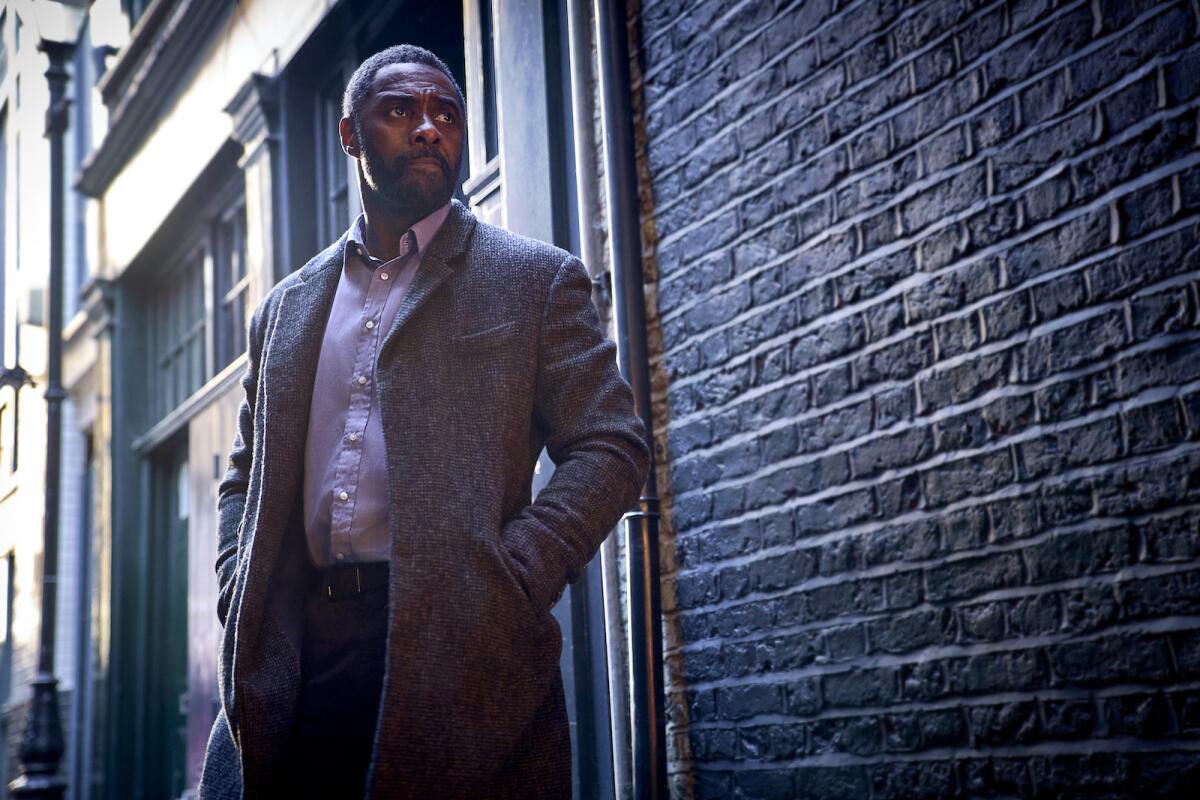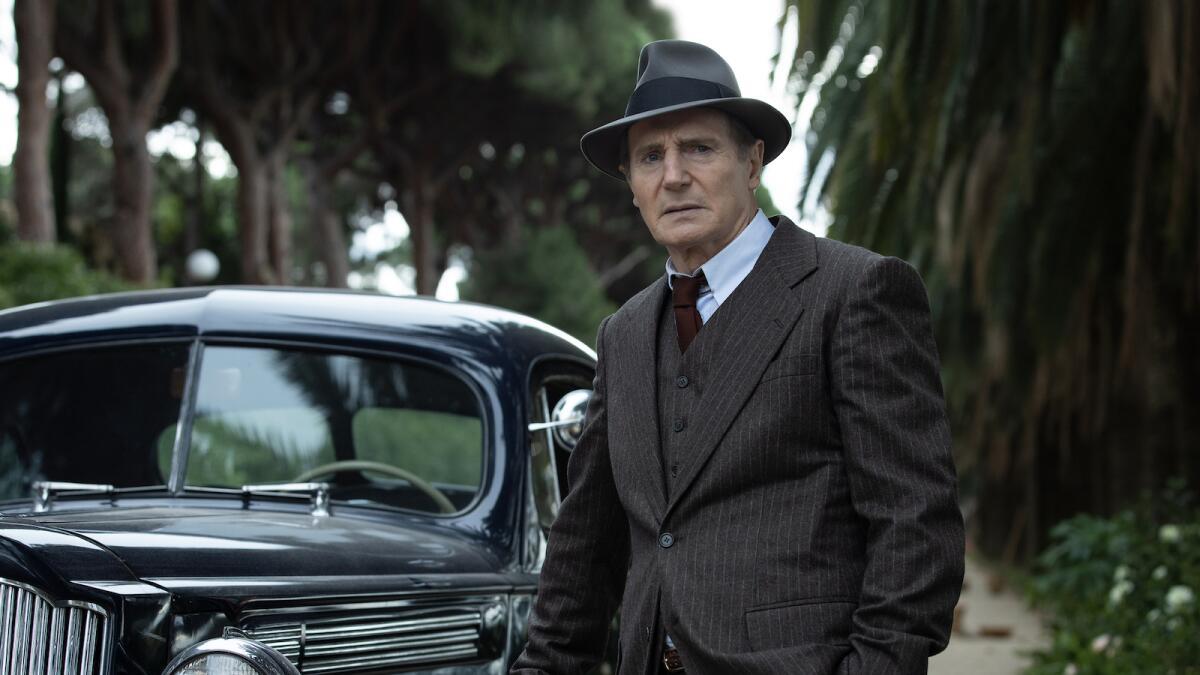Review: Deft performances elevate snappy thriller ‘Unseen’; Idris Elba is back as ‘Luther’

‘Unseen’
In the Michigan wilderness, the vision-impaired Emily (Midori Francis) — who has been abducted by her stalker ex-boyfriend Charlie (Michael Patrick Lane) — escapes into the woods without her glasses. She places a panicked call to a stranger who recently misdialed her. That stranger, Sam (Jolene Purdy), is a depressed stoner working a shift alone at a crummy Florida gas station. While she takes care of customers — including an obnoxiously demanding rich lady (Missi Pyle) — Sam acts as Emily’s eyes, guiding her to safety via their cellphone cameras.
Directed by Yoko Okumura from a screenplay by Salvatore Cardoni and Brian Rawlins, the chase thriller “Unseen” starts with this nifty premise, and for most of its short running time the filmmakers do a lot with it. Their style is snappy, with a frequent use of split screens to keep the action clear and a color scheme that distinguishes sunny Florida from gray Michigan. Their plotting is sharp too. A lot of thought has been put into how a janky old phone or wireless earbuds might affect Emily and Sam’s communication.
The film’s weakest parts involve shoehorning in more backstory for Emily and Sam as they talk about their lives to keep each other company. Yet even there, Francis and Purdy’s performances keep the scenes from feeling too much like an info-dump. The cast and the crew work well together in “Unseen,” delivering a taut, inventive picture about two young Asian American women helping each other survive one terrible day.
‘Unseen.’ Not rated. 1 hour, 16 minutes. Available on VOD

‘Luther: The Fallen Sun’
When the BBC TV series “Luther” debuted in 2010, it had two big things going for it. It had Idris Elba — already a veteran actor but not yet an international superstar — playing a police detective so committed to bringing down the worst of the worst that he frequently bent or even broke the law. It also had creator Neil Cross skillfully combining the grimness and violence of modern European mystery stories with the old-fashioned flash and action of a loose-cannon cop movie.
The first “Luther” film, “Luther: The Fallen Sun,” arrives four years after the show’s fifth and (thus far) final season. But this “Luther” doesn’t feel quite as special as the TV version did — perhaps because it’s not that unusual these days to see a hard-hitting, pulpy crime picture in which an ethically shaky detective stalks a serial killer.
Elba is still quite good as the antihero John Luther, who starts the story in jail due to some of the questionable choices he’s made over the years. When he inevitably escapes, Luther’s determined former colleague Odette Raine (Cynthia Erivo) mobilizes a team to find him. Meanwhile, the manipulative mastermind David Robey (played with entertaining gusto by Andy Serkis) is scandalizing London by broadcasting torture and murder on the internet.
The bulk of “Fallen Sun” leans on familiar “Luther” moves as our man ducks Raine while digging into Robey’s history — both in ways that raise questions about whether good guys sometimes need to be bad. Cross and director Jamie Payne (who also helmed the show’s Season 5) don’t radically reinvent the franchise here. Their budget allows for some bigger set-pieces and a wide variety of locations: from sleazy London sex shops to a spooky estate in a chilly clime. But “Fallen Sun” is best described as a movie-size version of a “Luther” season — which, for longtime fans, is better than no “Luther” at all.
‘Luther: The Fallen Sun.’ R, for disturbing/violent content, language and some sexual material. 2 hours, 9 minutes. Available on Netflix; also playing theatrically, Bay Theater, Pacific Palisades
‘I Got a Monster’
Anyone who watched writer-producers George Pelecanos and David Simon’s HBO six-episode drama “We Own This City” knows the story of the Baltimore Police Department’s Gun Trace Task Force, which went from being regarded as a community policing success story — with a phenomenal record for getting weapons and drugs off the streets — to becoming yet another cautionary tale of corruption. The TV series was great; but Kevin Casanova Abrams’ documentary “I Got a Monster” is good too, covering the same ground in a more compact running time, with some fresh perspectives.
Like the limited series, “I Got a Monster” focuses a lot on Sgt. Wayne Jenkins, whose GTTF crew was accused of robbing suspects, planting evidence and harassing law-abiding citizens. Abrams surrounds Jenkins’ story with anecdotes from some of the Baltimoreans who were terrorized and arrested by the force. The film’s centerpiece is a long and insightful interview with Ivan Bates, a defense attorney who spotted systematic irregularities in his criminal cases that pointed to something fishy going on. The documentary can feel a little scattered due to its multiple angles, but it remains a fascinating and relevant tale, examining how any criminal justice system built around the idea that cops never lie is ripe for abuse.
‘I Got a Monster.’ Not rated. 1 hour, 30 minutes. Available on VOD
‘Sound of Silence’
The Italian filmmaking collective known as T3 (consisting of writer-directors Alessandro Antonaci, Daniel Lascar and Stefano Mandalà) set out to jangle horror fans’ nerves with “Sound of Silence,” a supernatural thriller that uses sound itself as a weapon. After a prologue in which an older gentleman (Peter Stephen Wolmarans) is violently assaulted by a ghost conjured from an antique radio, the movie shifts focus to the man’s daughter, Emma (Penelope Sangiorgi), who flies home with her boyfriend Seba (Rocco Marazzita) to look after the house while her mom (Sandra Pizzullo) is at the hospital. While Emma — a professional singer — is playing around with her parents’ home studio equipment, she starts to hear some of the same eerie voices her dad did right before he was attacked.
Eventually, the spirits reveal to her the terrible crime that happened in that house long ago — though not before Emma wanders through a lot of dimly lighted, quietly atmospheric scenes, enduring a few jump-scares. “Sound of Silence” was expanded from a short, and frankly, there’s not enough character development or story here to fill a feature, and the film’s visual design lacks variety in both its locations and color palette. But the T3 crew are very good at ratcheting up tension through shifting shadows and abrasive noise. If nothing else, this movie is an effective demonstration of the directors’ ability to lull the audience into a relaxed state before knocking them around.
‘Sound of Silence.’ Not rated. 1 hour, 33 minutes. Available on VOD
‘Punch’
In writer-director Welby Ings’ debut feature, “Punch,” Jordan Oosterhof plays the handsome young boxer Jim, beloved by the ladies and admired by many of the lads in his seaside New Zealand town. Then Jim befriends Whetu (Conan Hayes), an openly gay high schooler and aspiring singer-songwriter who squats in a shack on the beach and suffers the verbal and physical abuse of local hooligans. Their relationship gradually blossoms into something more, threatening Jim’s budding career, his reputation in the community, and his relationship with his loving but troubled father (Tim Roth). The plot of “Punch” follows a fairly predictable path, and it lurches into overheated melodrama in its second half. But Ings does a fine job of capturing the instant connection between these two young men and in conveying Jim’s combination of excitement and terror when he realizes this bond could evolve easily into a romance.
‘Punch.’ Not rated. 1 hour, 39 minutes. Available on VOD; also playing theatrically, Laemmle Glendale
Also on VOD

“Marlowe” stars Liam Neeson as Raymond Chandler’s iconic literary private eye in an adaptation of a 2014 Benjamin Black novel that offered a new mystery for Philip Marlowe to solve. Directed by Neil Jordan — with a screenplay co-written by Jordan with William Monahan — the movie is a handsome-looking neo-noir, aimed at anyone who digs retro tough guys. Available on VOD
“Missing” is a follow-up of sorts to the hit 2018 thriller “Searching,” which cleverly told a twist-filled story using nothing but what the characters could see on their computer and cellphone screens. The new film features entirely new characters and a new plot — involving a teenager (Storm Reid) looking for her missing mom (Nia Long) — but it sticks to the same innovative “screenlife” storytelling format. Available on VOD
Available now on DVD and Blu-ray
“Mildred Pierce” is a classic hybrid of steamy Hollywood melodrama and ice-cold film noir, starring Joan Crawford as a wronged woman who slowly rebuilds her middle-class life after her ex-husband leaves her with almost nothing — but soon finds that no amount of money can fix her problems, either with men or with her bratty teenage daughter (Ann Blyth). The new Criterion edition Blu-ray includes an assortment of vintage interviews, as well as a documentary about Crawford. The Criterion Collection
More to Read
Only good movies
Get the Indie Focus newsletter, Mark Olsen's weekly guide to the world of cinema.
You may occasionally receive promotional content from the Los Angeles Times.










